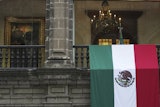As reported by the Associated Press
While they didn't announce any major agreements, President Bush and Chinese President Hu Jintao both agreed that they had a productive summit meeting. U.S. critics of China's trade policies had a different view.''The president failed to make any significant progress in talks with his Chinese counterpart,'' complained Kevin Kearns, the president of the U.S. Business and Industry Council, which represents around 1,500 small and medium-sized manufacturing companies.
Officials at the National Association of Manufacturers were only slightly less gloomy. ''This really sounds like a missed opportunity,'' said Frank Vargo, international vice president for the manufacturers' group. "We were really hoping that significant progress would be made so that both governments would begin to work together to address this very large trade imbalance.''
And on Capitol Hill, where lawmakers are pushing a variety of measures that would punish China for its current practices, lawmakers expressed disappointment in the outcome of Thursday's half-day summit at the White House.
''I am extremely disappointed that President Hu did not commit to take concrete steps to allow China's currency to reflect market forces,'' said Sen. Max Baucus, D-Mont., who is sponsoring legislation that would withhold certain economic benefits from China if it does not move faster on currency reform.
Hu spent Tuesday and Wednesday making stops in Washington state, including visits with officials of Microsoft Corp. and Boeing Co., in an effort to emphasize support for expanded U.S. exports to China.
Many American manufacturers contend that the Chinese yuan is undervalued by as much as 40%, making Chinese products cheaper for American consumers and American goods more expensive in China.
At the White House, Hu made it clear that he had not come to offer any new commitments. ''We have taken measures and we will continue to take steps to properly resolve the issue,'' Hu said.
Bush, who has the lowest approval ratings of his presidency and is facing growing voter unhappiness with America's record $202 billion trade deficit with China, sought to put the best face on the failure to make progress on a host of trade issues.
''He recognizes that a trade deficit with the United States, as substantial as it is, is unsustainable,'' Bush said during a joint photo opportunity with Hu.
The two leaders did agree to cooperate in constraining the nuclear ambitions of Iran and North Korea.
In addition to meeting at the White House with Bush, Hu also had a brief session with a small group of lawmakers. Rep. Mark Kirk, R-Ill., said the legislators ''very forcefully'' raised the issue of massive Chinese theft of copyrighted U.S. products.During a dinner sponsored by U.S. business interests Thursday night, Hu said China would never allow forces to split Taiwan away from China in any way and defended the country's human rights record.
Dennis Wilder, an official of Bush's National Security Council, praised Hu for publicly committing to structural reforms to move away from export-led growth but acknowledged the Chinese moves so far to revalue its currency are ''not nearly enough.''
White House officials refused to say whether Hu's comments would be enough to keep the Treasury Department from branding China as a ''currency manipulator'' in a report it must soon make to Congress.



















